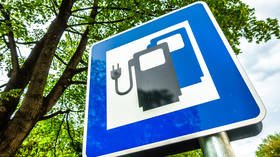Russia looks to reward electric vehicle buyers with rebates & toll-free roads

The Russian government has unveiled a broad program aimed at boosting electric vehicle (EV) use in the country. The ambitious plan is expected to drastically raise the share of EVs in less than a decade.
The estimated cost of the scheme is reportedly hovering around $7.9 billion, with private investments expected to amount to $6.7 billion. Most of the funds will reportedly be spent on developing charging infrastructure, while some of the money is earmarked for developing alternate EV and hydrogen fuel cell technologies.
Meanwhile, consumers would reportedly receive a subsidy of up to 25% on EVs costing $30,000 or less.
Also on rt.com Russia is finally embracing the electric vehicle boomThe number of electric vehicles is projected to total 730,000 units in eight years through 2030, with an initial target of around 25,000 to be reached by the end of 2024. The current number of EVs in the country is estimated at around 11,000, which mostly includes buses used for public transport in Moscow and other cities.
The share of EVs is expected to comprise at least 10% of the country’s light-vehicle market by 2030, according to the blueprint.
The program highlights that sufficient charging infrastructure will require at least one station for every 10 electric cars. Thus, a successful implementation of the plan will involve building nearly 73,000 charging stations by the end of the decade.
Moscow is negotiating agreements with foreign producers that don’t currently manufacture cars in Russia to produce and sell EVs in the country, according to Denis Pak, director of the Department of Automotive Industry and Railway Engineering in the Russian Ministry of Industry and Trade.
Also on rt.com Electric vehicle charging station market to reach $100 billion in less than decade – reportThe government is also considering low-interest loans for both global and domestic producers of low-carbon-emission transportation, and is planning to allow EVs on toll roads for free.
“The most important area of work is to support the production of electric vehicles and stimulate demand for them. For example, such vehicles will be included in concessional lending and leasing programs, and from next year there are plans to launch an experiment on the free passage of electric vehicles on toll roads,” the statement reads.
For more stories on economy & finance visit RT's business section












